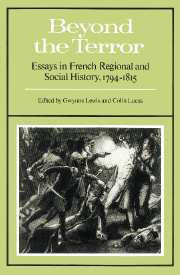Book contents
- Frontmatter
- Contents
- Contributors
- Preface
- 1 Cobb and the historians
- 2 The reconstruction of a church 1796–1801
- 3 Picking up the pieces: the politics and the personnel of social welfare from the Convention to the Consulate
- 4 Conscription and crime in rural France during the Directory and Consulate
- 5 Common rights and agrarian individualism in the southern Massif Central 1750–1880
- 6 Themes in southern violence after 9 thermidor
- 7 Political brigandage and popular disaffection in the south-east of France 1795–1804
- 8 Rhine and Loire: Napoleonic elites and social order
- Index
8 - Rhine and Loire: Napoleonic elites and social order
Published online by Cambridge University Press: 04 November 2009
- Frontmatter
- Contents
- Contributors
- Preface
- 1 Cobb and the historians
- 2 The reconstruction of a church 1796–1801
- 3 Picking up the pieces: the politics and the personnel of social welfare from the Convention to the Consulate
- 4 Conscription and crime in rural France during the Directory and Consulate
- 5 Common rights and agrarian individualism in the southern Massif Central 1750–1880
- 6 Themes in southern violence after 9 thermidor
- 7 Political brigandage and popular disaffection in the south-east of France 1795–1804
- 8 Rhine and Loire: Napoleonic elites and social order
- Index
Summary
A few years ago, while preparing a review article on Marxist interpretations of the French Revolution, I realised how lonely someone looking at that debate from the Napoleonic end, the ‘other’ end as it were, could feel. If the historiographical consensus which passed as the orthodox view of the Revolution from the 1930s to the 1950s could be called ‘Marxist’, granted a good deal of diversity within its fraternity, its main focus was on the revolutionary period itself, or on what were considered ‘strategic’ parts of it. Since the mounting attack on received Marxist lore, first in the Anglo-Saxon countries, and then in France itself, the limelight seems to have shifted from the years 1789–94 to the old regime, in other words to the ‘causes’ or ‘origins’ of the Revolution. That indeed is now the main area of pragmatic research on the subject. Few historians, whether for or against the ‘bourgeois revolution’ of the Marxist paradigm, would now insist that the Year II was the strategic or exemplary year of the Revolution. If anything, it is seen as an aberration, as an atypical phase. Whatever else it has done, the debate on the Marxist interpretations has made us all much more aware of the empirical continuities of French social and economic history, and especially of the constancy of landed relationships.
Yet Marxists have never abandoned their fundamental concept of the French Revolution as a ‘bourgeois revolution’, even if some among them have redefined the term in the light of more recent factual evidence.
- Type
- Chapter
- Information
- Beyond the TerrorEssays in French Regional and Social History 1794-1815, pp. 232 - 268Publisher: Cambridge University PressPrint publication year: 1983
- 1
- Cited by

